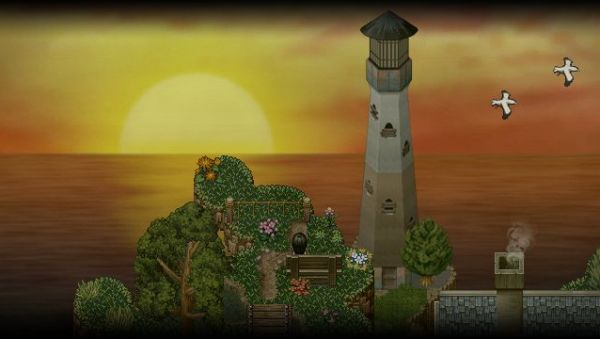To the Moon is an indie-developed game by Freebird games available on the Steam store and through the Freebird games website. Over the end of last week, I got the chance to sit down with the game and go through it and was extremely impressed. For those of you familiar with Journey (which I may or may not review at a later point) by thatgamecompany, this was a very similar experience. Both studios were forced to affect the player through gameplay, atmosphere and story rather than graphics or other aspects in which AAA studios with huge budgets have an insurmountable edge. Ultimately, I think both succeeded, although in different ways.
Journey was a visceral experience for me. The silence of the characters in the empty vistas of the game's backgrounds, combined with the power behind the soundtrack to really leave me feeling my way forward--as opposed to thinking about my actions--in a way which is hard to even describe. The impact that a friendly co-player could have was likewise impactful. As I played, I constantly found myself lost in the game with my silent guide (a person with whom I had never interacted though we are now PSN friends because of this experience). To the Moon affected me in a different way, though to similarly positive ends. Where Journey is a game that you feel in the depths of your soul, To the Moon is much more cerebral.
In To the Moon, the player takes control of two doctors (Eva and Neil) in the present day. Eva and Neil work for a company whose job it is to grant the final wish of dying individuals. Though not able to actually change the past, Eva and Neil accomplish their task by manipulating the memories of their client so that they believe their wish to have been achieved (and depending on the stance one takes on memory v. reality, maybe the clients' realities do change). All clients are different, and this one--John--wants to go to the moon. In order to change his life/memories, Eva and Neil travel backwards through John's memories searching for the trigger that would cause his alternate self to visit our closest astronomical neighbor. While at first only doing their jobs, the execution of this search ultimately entails Eva and Neil viewing the narrative of John's life, which becomes the central story of the game. All of the characters of John's life--from his mother to his wife to his childhood friend--say or do things at points that are at first confusing, but make sense as the player moves backwards through John's memories. As Eva and Neil grow more attached to John and his story, so too does the player, and these little puzzles constantly draw one to play through just one more memory to see if a certain theory might be correct.
 |
| The vistas in To the Moon can be breathtaking despite graphical limitations |
The gameplay of To the Moon is not quite as intellectually challenging as the game's subject matter. Travelling backwards through memories requires finding certain objects that link memories together as well as exploring and discovering enough about each memory to be able to unlock these objects. Once unlocked, each object can be used as a conduit to the next memory, provided the player can solve a tile-based puzzle in which certain tiles need to be flipped to reveal a completed picture. While this could conceivably be a difficult task, none of the puzzles in To the Moon require much thought, and the main thrust of the game is clearly the story. In fact, if these puzzles were very much longer, their getting in the way of the narrative's progression might be frustrating.
The soundtrack of the game is simple, but powerful. 'For River' was an especially moving song for me, and the themes that play during dramatic moments also properly highlight the import of the conversations or actions taking place. Voice acting never detracts from the story, though it rarely adds much to it either.
 |
| Yes, those are origami rabbits...why are they there? Play the game to find out! |
Ultimately, the reason to give To the Moon a chance will not be found in the gameplay, soundtrack or graphics (simple sprites), but in the characters and their story as it relates to John and his memories. Without getting into any of the spoilerific details, I can assure you that the story kept me wanting to play just a little bit more to find the resolution I sought, whether that was for a simple explanation of a character's action or for the resolution to the ultimate puzzle of John's life: why he wants to go to the moon. The novel mechanic of moving backwards through the memories really did provide a layer of understanding to each of the characters that was unique in my gaming experience and I always felt that Neil and Eva were moving along the same path I was, towards a real identification with John and the struggles and triumphs of his life. Though part of a planned series, this game is perfectly capable of standing alone. The story and its ending will leaves players with a satisfying mix of emotions and questions, an appropriate conclusion to this cerebral experience. To the Moon is definitely an experience that I enjoyed and as a cheaper indie game is undeniably worth it.
Status: Recommended
No comments:
Post a Comment